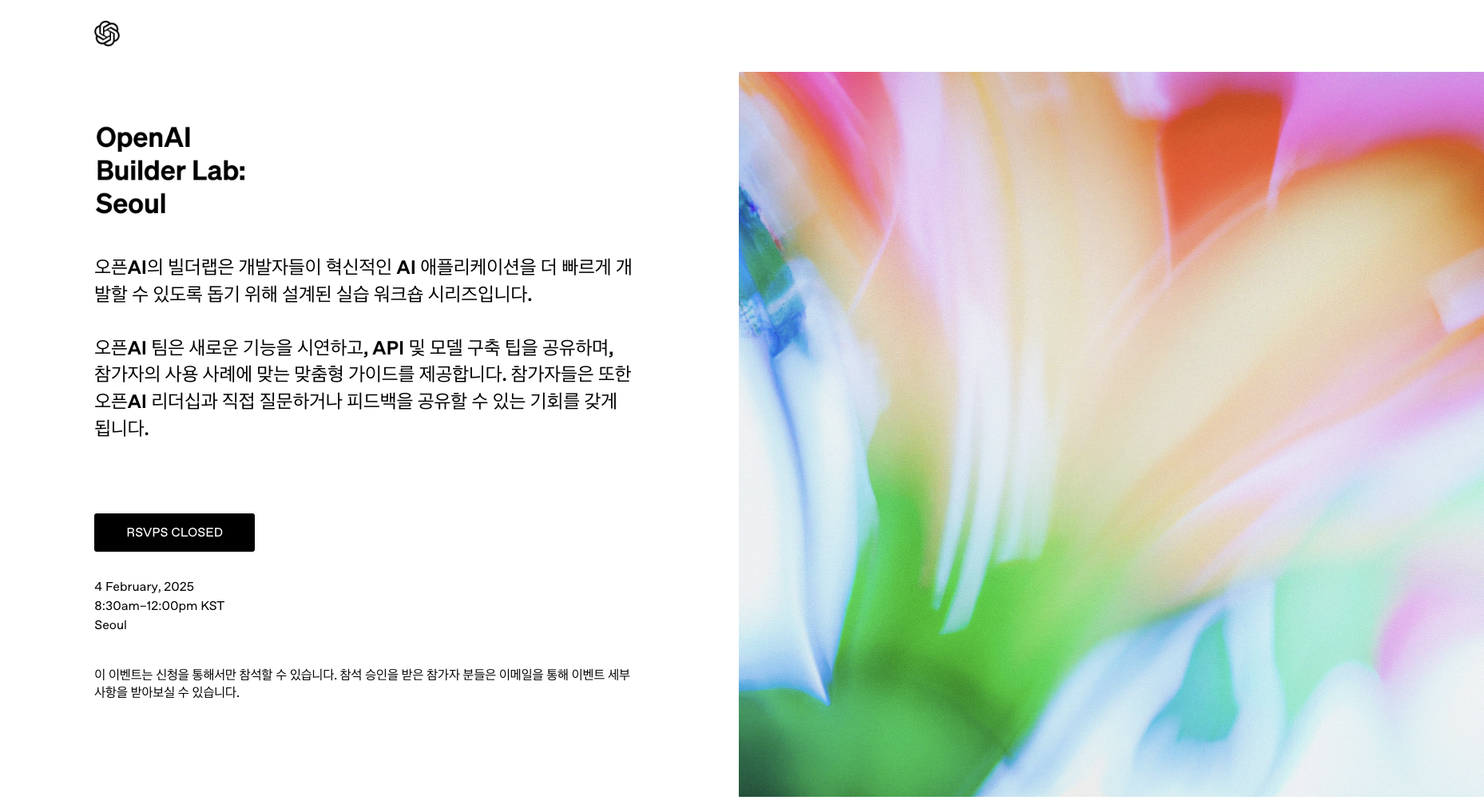CLIWANT Meets Sam Altman at OpenAI Builder Lab in Seoul! 🚀

On February 4th, OpenAI hosted the OpenAI Builder Lab: Seoul at The Plaza Hotel in Seoul, led by CEO Sam Altman and Chief Product Officer Kevin Weil. This exclusive, invitation-only event brought together approximately 100 CTOs and developers, including leading Korean AI startups that collaborated with OpenAI through its Global Partnership Program in March 2024, such as CLIWANT.

OpenAI Unveils 2025 AI Roadmap
At today’s workshop, OpenAI CEO Sam Altman shared insights into AI’s future, unveiling the 2025 roadmap with a strong focus on scaling. Key areas include:
🔹 Models and Customization – Expanded fine-tuning options
🔹 Multimodality – Advancements in multimodal AI, including speech recognition
🔹 Agent Orchestration – Optimized integration and utilization of AI agents
The session followed this agenda:
✅ Ask OpenAI Leaders – Q&A with Sam Altman & Kevin Weil
✅ Learn Exclusive Tips – Insights unavailable online
✅ Build with OpenAI – Hands-on collaboration with the OpenAI team
Workshop materials are available on GitHub.
Zimin Park, AI Engineer at CLIWANT, attends the event
Key Takeaways from OpenAI’s Q&A: Perspectives on the Korean Market & AI Advancements
During the Q&A session with Sam Altman and Kevin Weil, several noteworthy questions were discussed, covering topics from OpenAI’s strategy in Korea to AI advancements and industry applications.
1️⃣ OpenAI’s Perspective on the Korean Market
Q: OpenAI’s latest features tend to launch later in Korea. Is Korea being overlooked?
A: OpenAI’s visit to Korea aims to strengthen collaboration with local startups. Korea plays a critical role in the semiconductor and energy sectors and is recognized as a key player in the AI ecosystem.
Q: What strategies does OpenAI have for the Korean market?
A: Similar to our large-scale partnerships in Japan, we are in discussions with major Korean enterprises and startups for collaboration. Given Korea’s high AI adoption rate and strong technological foundation, we see significant growth opportunities.
2️⃣ AI Model Development & Optimization
Q: How does OpenAI plan to improve model fine-tuning and optimization?
A: Fine-tuning was once a resource-intensive process, requiring massive datasets. However, with our O-series models, it is now possible to achieve high performance with significantly less data. Moving forward, we will focus on custom AI model optimization, enabling users to tailor models to their specific needs.
Q: What factors are prioritized in model improvement?
A: Reducing error rates is a primary focus. People are generally forgiving of human errors but far less tolerant of AI mistakes. For instance, even if autonomous vehicles are five times safer than human drivers, public trust remains uncertain. Similarly, an AI doctor would need to make 100 times fewer mistakes than a human physician to gain widespread acceptance. Our ultimate research goal is to develop an AI model capable of solving one billion university-level math problems with zero errors, pushing the boundaries of logical reasoning in AI.
Q: How does OpenAI collaborate with partners for model optimization?
A: Beyond improving the model itself, data-driven fine-tuning is crucial. Our approach is not just about delivering AI models but empowering partners to create differentiated solutions. A key focus is helping customers fine-tune models with their proprietary data to enhance performance.
3️⃣ AI’s Role in Industry & Emerging Applications
Q: Does OpenAI plan to develop ‘killer apps’ or AI agents for specific industries?
A: Our core strategy is focused on General Intelligence, with ChatGPT as a central component. However, we remain open to collaboration in industry-specific (Vertical AI) applications.
Q: What impact will AI have on various industries?
A: AI presents opportunities to eliminate inefficiencies across industries. Consider restaurant reservations—traditionally, a person would call a restaurant to check availability. With AI, an agent could call multiple restaurants simultaneously, assess table availability, and recommend the best option based on user preferences—something impossible for a human to do manually. This is the type of AI-driven transformation we expect to see across sectors.
Q: OpenAI recently launched ‘Deep Research.’ How is it being used?
A: While initially designed for scientific paper searches, it is now being applied in e-commerce, consulting, and tax analysis, demonstrating the unexpected creativity of users in leveraging AI.
4️⃣ Robotics & AI Expansion into New Fields
Q: What are OpenAI’s plans for robotics?
A: Initially, it was too early to invest heavily in robotics. However, with recent advancements in video models and mechanical engineering, we believe the timing is now ideal to pursue research in this space.
Q: How does OpenAI address data privacy concerns in sensitive fields like healthcare?
A: We are currently working toward HIPAA compliance to ensure OpenAI products can be used securely in medical applications. That said, healthcare is not our core focus—instead, we prioritize accelerating scientific research using AI.
CLIWANT: AI for Smarter Procurement
CLIWANT is revolutionizing the procurement industry with AI-driven RFP analytics. As an OpenAI partner startup and a Google AI Academy-selected member, we help businesses secure more government contracts with ease and precision.
Regarding CLIWANT’s selection, CEO Junho Cho stated, "The synergy between OpenAI’s general-purpose models and CLIWANT’s industry-specific data expertise in procurement was a key factor in our selection."
On February 11, Junho Cho will be speaking at AI Seoul 2025, held at COEX. His session will explore procurement industry innovation through the lens of Elon Musk’s DOGE case study.
Operating in Korea and Singapore, CLIWANT is committed to transforming the way procurement professionals work AI-driven technology. A recent industry study, conducted in collaboration with Northwestern University, found that CLIWANT clients achieved:
📈 $150K average revenue growth compared to non-clients
⏳ 62% reduction in procurement process time
💡 Immediate ROI and continued growth after adopting CLIWANT
Looking ahead, CLIWANT will continue its partnership with OpenAI, driving AI-powered, data-centric innovation in the global procurement market.
🔗 Website: cliwant.com
📝 Blog: blog.cliwant.com
